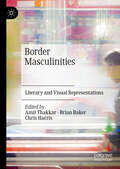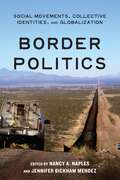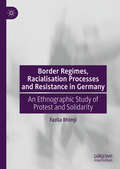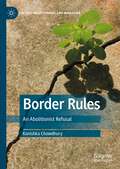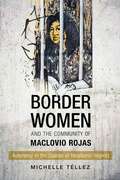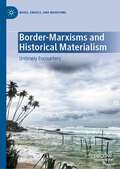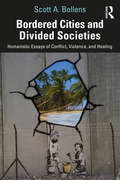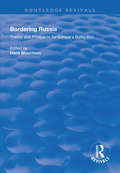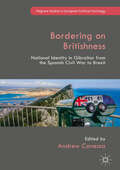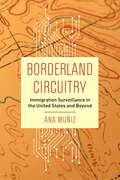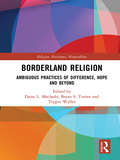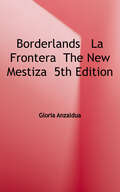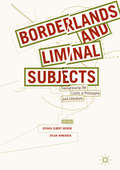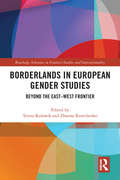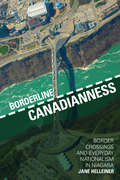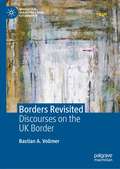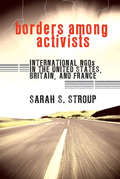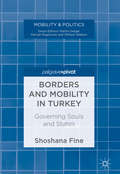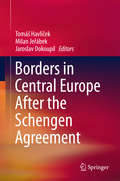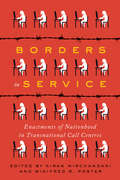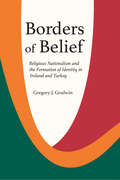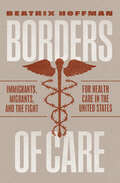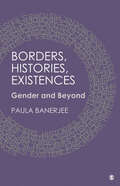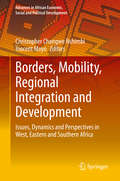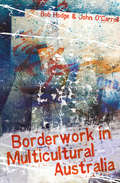- Table View
- List View
Border Masculinities: Literary and Visual Representations
by Chris Harris Amit Thakkar Brian BakerThis volume collates and examines literary and screened representations of what the editors term ‘border masculinities’. It seeks to understand masculine subjectivities, through fiction and screen, within a complex global arena of relationships and fluid movements across multiple boundaries within that arena. It also concerns paradigmatic borders related to class, gender and ethnicities, as well as other theoretical parameters which cut across porous spatial boundaries. This collection contains a range of theoretically informed responses to varying cultural representations of such masculinities in Europe, the Americas, the Caribbean, Australasia and Asia. Thematic and conceptual connections between them are discussed in the introductory chapter and such links are also made between chapters.
Border Politics: Social Movements, Collective Identities, and Globalization
by Nancy A. Naples and Jennifer Bickham MendezIn the current historical moment borders have taken on heightened material and symbolic significance, shaping identities and the social and political landscape. “Borders”—defined broadly to include territorial dividing lines as well as sociocultural boundaries—have become increasingly salient sites of struggle over social belonging and cultural and material resources. How do contemporary activists navigate and challenge these borders? What meanings do they ascribe to different social, cultural and political boundaries, and how do these meanings shape the strategies in which they engage? Moreover, how do these social movements confront internal borders based on the differences that emerge within social change initiatives?Border Politics, edited by Nancy A. Naples and Jennifer Bickham Mendez, explores these important questions through eleven carefully selected case studies situated in geographic contexts around the globe. By conceptualizing struggles over identity, social belonging and exclusion as extensions of border politics, the authors capture the complex ways in which geographic, cultural, and symbolic dividing lines are blurred and transcended, but also fortified and redrawn. This volume notably places right-wing and social justice initiatives in the same analytical frame to identify patterns that span the political spectrum. Border Politics offers a lens through which to understand borders as sites of diverse struggles, as well as the strategies and practices used by diverse social movements in today’s globally interconnected world. Contributors: Phillip Ayoub, Renata Blumberg, Yvonne Braun, Moon Charania, Michael Dreiling, Jennifer Johnson, Jesse Klein, Andrej Kurnik, Sarah Maddison, Duncan McDuie-Ra, Jennifer Bickham Mendez, Nancy A. Naples, David Paternotte, Maple Razsa, Raphi Rechitsky, Kyle Rogers, Deana Rohlinger, Cristina Sanidad, Meera Sehgal, Tara Stamm, Michelle Téllez
Border Regimes, Racialisation Processes and Resistance in Germany: An Ethnographic Study of Protest and Solidarity
by Fazila BhimjiIllustrating new resistance strategies and mobilisations, this volume examines how EU citizens and refugee populations in Germany have opposed asylum policies and coped with hostile migration regimes. Taking as her starting point occupations of a Berlin square in 2012, the author weaves an auto-ethnographic account of her own involvement in solidarity and refugee resistance groups with archival examinations of various strategies. The book analyzes how activism is sustained in multiple ways: media solidarity groups challenge mainstream depictions; radio shows attempt to decolonize the media and resist the category of ‘refugee’; a group of women comprised of migrants and asylum-seekers publish their accounts; solidarity groups help migrants to find temporary housing; campaigns align with existing groups or engage with political conversations more broadly to challenge populism, racism, and anti-migrant sentiment. As she bridges practical solidarity, media activism, and other strategies, Fazila Bhimji builds a framework to show how these tactics interrelate, interrogating specifically if the fragmentation of strategies limits anti-racist struggles, or whether providing manifold outlets for a collective struggle helps to build solidarity.
Border Rules: An Abolitionist Refusal (Politics of Citizenship and Migration)
by Kanishka ChowdhuryThis book examines both border policies and oppositional narratives of “the border,” 2011–2021, demonstrating that the term designates not merely a line of territorial control but also a set of social relations shaped by persistent, racially differentiated colonial structures and, more recently, by neoliberal modes of accumulation. These relations are shown to determine access to wealth and/or resources and to enable the management of labor, the extraction of surplus, and the accumulation of capital. Discussion in the book is informed by the history of these policies and by the critical literature on borders. Various cultural texts focusing on two border zones—the US–Mexico and the EU–Southern Mediterranean—are analyzed: specifically, two novels, two films, and two murals examined in conjunction with a music video. A path to a borderless future is suggested: an abolitionist refusal of border rules with an insistence on the necessity of abolition.
Border Women And The Community Of Maclovio Rojas: Autonomy In The Spaces Of Neoliberal Neglect
by Michelle TéllezNear Tijuana, Baja California, the autonomous community of Maclovio Rojas demonstrates what is possible for urban place-based political movements. More than a community, Maclovio Rojas is a women-led social movement that works for economic and political autonomy to address issues of health, education, housing, nutrition, and security. Border Women and the Community of Maclovio Rojas tells the story of the community’s struggle to carve out space for survival and thriving in the shadows of the U.S.-Mexico geopolitical border. This ethnography by Michelle Téllez demonstrates the state’s neglect in providing social services and local infrastructure. This neglect exacerbates the structural violence endemic to the border region—a continuation of colonial systems of power on the urban, rural, and racialized poor. Téllez shows that in creating the community of Maclovio Rojas, residents have challenged prescriptive notions of nation and belonging. Through women’s active participation and leadership, a women’s political subjectivity has emerged—Maclovianas. These border women both contest and invoke their citizenship as they struggle to have their land rights recognized, and they transform traditional political roles into that of agency and responsibility. This book highlights the U.S.-Mexico borderlands as a space of resistance, conviviality, agency, and creative community building where transformative politics can take place. It shows hope, struggle, and possibility in the context of gendered violences of racial capitalism on the Mexican side of the U.S.-Mexico border.
Border-Marxisms and Historical Materialism: Untimely Encounters (Marx, Engels, and Marxisms)
by Aditya NigamThis book engages with the diverse traditions within non-Western Marxisms, as they emerge across the Global South, positioning itself against calls for a “pure” Marxism. The author views Marxism as a conceptual “field,” similar to electromagnetic or gravitational fields, where bodies and objects impact other bodies and objects without necessarily coming in contact with them. So too, in the “field” of Marxism, people behave in specific ways and deploy languages and concepts with their own specific inflections and accents. While rejecting the view of Marxism as an inherently European and fully-formed doctrine that is corrupted by contact with alien contexts, Nigam simultaneously acknowledges the residual force of certain elements of the theory and the gravitational pull that the authoritative figures continue to have on the evolution of the field in non-Western contexts. He argues that since a large part of Marxism’s earthly journey was undertaken in the Global South, it is that experience that needs to be rendered legible, by setting aside the conceptual lens of Western Marxism that repeatedly misreads such experience. Ultimately, the book invites a fruitful and challenging re-examination of a variety of phenomena arising from the contemporaneous co-existence of pre-capitalist and capitalist social relations that have been an inextricable part of the majority of the world—what the author terms “untimely encounters.”
Bordered Cities and Divided Societies: Humanistic Essays of Conflict, Violence, and Healing
by Scott A. BollensBordered Cities and Divided Societies is a provocative, moving, and poetic encounter with the hearts and minds of individuals living in nine cities of conflict, violence, and healing—Jerusalem, Belfast, Johannesburg, Nicosia, Sarajevo, Mostar, Barcelona, Bilbao, and Beirut. Based on research spanning 25 years, including 360 interviews and over two and a half years of in-country field research, this innovative work employs a series of concise reflective narrative essays, grouped into four thematic sections, to provide a humanistic, “on-the-ground” understanding of divided cities, conflict, and peacemaking. Incorporating both scholarly analyses based on empirical research and introspective essays, Bollens digs underneath grand narratives of conflict to illuminate the complexities and paradoxes of living amid nationalistic political strife and the challenges of planning and policymaking in divided societies. Richly illustrated, the book includes informative synopses about the cities that provide access for general readers while extensive connections to recent literature enhance the book’s research value to scholars.
Bordering Russia: Theory and Prospects for Europe's Baltic Rim (Routledge Revivals)
by Hans MouritzenFirst published in 1998, this book exsplores the dilemma in Western policy towards Russia in recent years is whether to admit into NATO and the EU all those countries who wish to join, or whether to respect Russian sensitivities and be more selective. The Dilemma is at its peak for those countries bordering Russia; they are the ones who fear Russia the most, but whose integration into the West provokes Russia the most, a situation likely to strengthen Russian non-democratic forces. This is the dilemma that the present volume evolves around. Apart from stressing geopolitical fundamentals and the countries’ historical experiences, the book is also future-orientated. Will Europe’s Baltic rim become an outpost of the West with an iron curtain to its East, will it become an extensive ‘grey zone’, or will the countries become Western bridge-builder’s eastwards?
Bordering on Britishness: National Identity in Gibraltar from the Spanish Civil War to Brexit (Palgrave Studies in European Political Sociology)
by Andrew CanessaThis volume explores how Gibraltarian Britishness was constructed over the course of the twentieth century. Today most Gibraltarians are fiercely proud of their Britishness, sometimes even describing themselves as ‘more British than the British’ and Gibraltar’s Chief Minister in 2018 announced in a radio interview that “We see the world through British eyes.” Yet well beyond the mid-twentieth century the inhabitants of the Rock were overwhelmingly Spanish speaking, had a high rate of intermarriage with Spaniards, and had strong class links and shared interests with their neighbours across the border. At the same time, Gibraltarians had a very clear secondary status with respect to UK British people. By the beginning of the twenty-first century, however, Gibraltarians speak more English than Spanish (with increasing English monolingualism), have full British citizenship and are no longer discriminated against based on their ethnicity; they see themselves as profoundly different culturally to Spanish people across the border. Bordering on Britishness explores and interrogates these changes and examines in depth the evolving relationship Gibraltarians have with Britishness. It also reflects on the profound changes Gibraltar is likely to experience because of Brexit when its border with Spain becomes an external EU border and the relative political strengths of Spain and the UK shift accordingly. If Gibraltarian Britishness has evolved in the past it is certain to evolve in the future and this volume raises the question of how this might change if the UK’s political and economic strength – especially with respect to Gibraltar – begins to wane.
Borderland Circuitry: Immigration Surveillance in the United States and Beyond
by Ana MuñizPolitical discourse on immigration in the United States has largely focused on what is most visible, including border walls and detention centers, while the invisible information systems that undergird immigration enforcement have garnered less attention. Tracking the evolution of various surveillance-related systems since the 1980s, Borderland Circuitry investigates how the deployment of this information infrastructure has shaped immigration enforcement practices. Ana Muñiz illuminates three phenomena that are becoming increasingly intertwined: digital surveillance, immigration control, and gang enforcement. Using ethnography, interviews, and analysis of documents never before seen, Muñiz uncovers how information-sharing partnerships between local police, state and federal law enforcement, and foreign partners collide to create multiple digital borderlands. Diving deep into a select group of information systems, Borderland Circuitry reveals how those with legal and political power deploy the specter of violent cross-border criminals to justify intensive surveillance, detention, brutality, deportation, and the destruction of land for border militarization.
Borderland Religion: Ambiguous practices of difference, hope and beyond (Religion, Resistance, Hospitalities)
by Daisy L. Machado Bryan S. Turner Trygve Eiliv WyllerBorderland Religion narrates, presents and interprets the fascinating and significant practices when borders, migrants and religion intersect. This collection of original essays combines theology, philosophy and sociology to examine diverse religious issues surrounding external national borders and internal domestic borders as these are challenged by the unstoppable flow of documented and undocumented migrants. While many studies of migration have examined how religion plays a major role in the assimilation and integration of waves of migration, this volume looks at a number of empirical studies of how emergent religious practices arise around border crossings. The volume begins with a detailed analysis of the borderland religion context and research. The aim is to bring an eschatological interpretation of the borderland religion, its impact and significance for migrants. Themes include a critical analysis of how religion has formatted Europe; empirical studies from the US/Mexican border and Southern Africa; an overview of the European refugee crisis in 2015; editors’ account of borderland religion from the perspective of citizenship studies. Contributions of scholars from a broad range of disciplines ensure a careful analysis of this highly topical situation. The volume’s interdisciplinary profile will appeal to scholars and students in religious studies, migration studies, theology and citizenship studies.
Borderlands / La Frontera: The New Mestiza
by Gloria AnzaldúaA new edition of Anzaldúa's classic text. "The U.S-Mexican border es una herida abierta where the Third World grates against the first and bleeds. And before a scab forms it hemorrhages again, the lifeblood of two worlds merging to form a third country—a border culture." <p>Gloria Anzaldúa <p><p>Rooted in Gloria Anzaldúa's experience as a Chicana, a lesbian, an activist, and a writer, the essays and poems in BORDERLANDS/LA FRONTERA: THE NEW MESTIZA profoundly challenged, and continue to challenge, how we think about identity. BORDERLANDS/LA FRONTERA remaps our understanding of what a "border' is, presenting it not as a simple divide between here and there, us and them, but as a psychic, social, and cultural terrain that we inhabit, and that inhabits all of us.
Borderlands and Liminal Subjects: Transgressing the Limits in Philosophy and Literature
by Jessica Elbert Decker Dylan WinchockBorders are essentially imaginary structures, but their effects are very real. This volume explores both geopolitical and conceptual borders through an interdisciplinary lens, bridging the disciplines of philosophy and literature. With contributions from scholars around the world, this collection closely examines the concepts of race, nationality, gender, and sexuality in order to reveal the paradoxical ambiguities inherent in these seemingly solid binary oppositions, while critiquing structures of power that produce and police these borders. As a political paradigm, liminality may be embraced by marginal subjects and communities, further blurring the boundaries between oppressive distinctions and categories.
Borderlands in European Gender Studies: Beyond the East–West Frontier (Routledge Advances in Feminist Studies and Intersectionality)
by Teresa Kulawik Zhanna KravchenkoChallenging persistent geopolitical asymmetries in feminist knowledge production, this collection depicts collisions between concepts and lived experiences, between academic feminism and political activism, between the West as generalizable and the East as the concrete Other. Borderlands in European Gender Studies narrows the gap between cultural analysis and social theory, addressing feminist theory’s epistemological foundations and its capacity to confront the legacies of colonialism and socialism. The contributions demonstrate the enduring worth of feminist concepts for critical analysis, conceptualize resistance to multiple forms of oppression, and identify the implications of the decoupling of cultural and social feminist critique for the analysis of gender relations in a postsocialist space. This book will be of import to activists and researchers in women’s and gender studies, comparative gender politics and policy, political science, sociology, contemporary history, and European studies. It is suitable for use as a supplemental text for advanced undergraduate and graduate courses in a range of fields.
Borderline Canadianness: Border Crossings and Everyday Nationalism in Niagara
by Jane HelleinerCanada and the United States share the world's longest international border. For those living in the immediate vicinity of the Canadian side of the border, the events of 9/11 were a turning point in their relationship with their communities, their American neighbours and government officials. Borderline Canadianness offers a unique ethnographic approach to Canadian border life. The accounts of local residents, taken from interviews and press reports in Ontario's Niagara region, demonstrate how borders and everyday nationalism are articulated in complex ways across region, class, race, and gender. Jane Helleiner's examination begins with a focus on the "de-bordering" initiated by NAFTA and concludes with the "re-bordering" as a result of the 9/11 attacks. Her accounts of border life reveals disconnects between elite border projects and the concerns of ordinary citizens as well as differing views on national belonging. Helleiner has produced a work that illuminates the complexities and inequalities of borders and nationalism in a globalized world.
Borders Revisited: Discourses on the UK Border (Migration, Diasporas and Citizenship)
by Bastian A. VollmerThe nature and configuration of borders, and the relationship between state borders and societies, have changed. In the 21st century, internationalism, transnationalism, and super-diversity have further provoked complexities and anxieties. It seems that as border and migration regimes undergo dramatic transformations, their public profile increases.This book revisits borders, bordering practices, and meanings, with a particular focus on the United Kingdom as a case study. Bastian A. Vollmer examines not only the theoretical and historical dimensions of borders but also various empirical data, including extensive text corpora and dozens of in-depth interviews. Expanding on the concept of vernacular security—that is, an everyday understanding of security—he argues that the existential value of borders is not merely physical, but extends into the order and future construction of states and societies.This book demonstrates decisively that the concept of the border has not left the centre stage of philosophy, political theory, and political sociology, but has instead emerged as a focal point for multidisciplinary engagements. It further demonstrates how attention to a vernacular perspective can inform those engagements, yielding vital insights. As such, it should appeal to students and scholars across disciplines interested in the contemporary development and relevance of borders and their discursive cultures.
Borders among Activists: International NGOs in the United States, Britain, and France
by Sarah S. StroupIn Borders among Activists, Sarah S. Stroup challenges the notion that political activism has gone beyond borders and created a global or transnational civil society. Instead, at the most globally active, purportedly cosmopolitan groups in the world-international nongovernmental organizations (INGOs)-organizational practices are deeply tied to national environments, creating great diversity in the way these groups organize themselves, engage in advocacy, and deliver services.Stroup offers detailed profiles of these "varieties of activism" in the United States, Britain, and France. These three countries are the most popular bases for INGOs, but each provides a very different environment for charitable organizations due to differences in legal regulations, political opportunities, resources, and patterns of social networks. Stroup's comparisons of leading American, British, and French INGOs-Care, Oxfam, Médicins sans Frontières, Human Rights Watch, Amnesty International, and FIDH-reveal strong national patterns in INGO practices, including advocacy, fund-raising, and professionalization. These differences are quite pronounced among INGOs in the humanitarian relief sector, and are observable, though less marked, among human rights INGOs.Stroup finds that national origin helps account for variation in the "transnational advocacy networks" that have received so much attention in international relations. For practitioners, national origin offers an alternative explanation for the frequently lamented failures of INGOs in the field: INGOs are not inherently dysfunctional, but instead remain disconnected because of their strong roots in very different national environments.
Borders and Mobility in Turkey: Governing Souls and States (Mobility & Politics)
by Shoshana FineIn the last two decades, Turkey has witnessed a variety of bordering interventions rooted in its problematisation as variously "transit," "destination," "European," "Muslim" and "safe. " This book brings into focus seemingly disparate actors involved in such interventions, from the EU and international organisations to missionaries, security professionals and migrants themselves. It exposes how these actors depend upon the intersecting rationalities of managerialism, securitisation, humanitarianism and orientalism to control, contain, process, save and soul-lift mobile populations.
Borders in Central Europe After the Schengen Agreement
by Tomáš Havlíček Milan Jeřábek Jaroslav DokoupilThis book is the result of research into the considerable impacts the signing of the Schengen Agreement has had on the border regions of the signatory, in particular the Central European internal borders. The analysis provides an in-depth look at European integration, development and perception at the state level as well as in the selected border regions of Central Europe. The book discusses results from population questionnaires in this region, and presents the most important features of development of border regions within Central European internal borders/borderlands after the Schengen Agreement. This book is suitable for students and researchers dealing with the borderlands, but also outlines sufficient information to be of interest to regional planners and policy makers.
Borders in Service: Enactments of Nationhood in Transnational Call Centres
by Kiran Mirchandani Winifred PosterBorders in Service traces the intersection of service labour and national identity across global call centres in seven countries: El Salvador, Guatemala, Guyana, Mauritius, Morocco, the Philippines, and the US-Mexico border. While most studies on offshore call centres have focused on India this collection explores the experiences of call center workers in many of the newly emerging hubs of transnational service work. In this collection, Kiran Mirchandani and Winifred Poster have gathered a wide range of contributors to explore the dynamics within global call centres. Such dynamics include: language, speech, accent issues, expressions of consumer sentiment, physical space, and organizational, human resource, and labour policies. By grounding the theoretical debates on nationhood and labour in the realities of daily life in global call centres, Mirchandani and Poster have created a timely, accessible and revealing collection that will change what we know about offshored customer service work.
Borders of Belief: Religious Nationalism and the Formation of Identity in Ireland and Turkey
by Gregory J. GoalwinReligion and nationalism are two of the most powerful forces in the world. And as powerful as they are separately, humans throughout history have fused religious beliefs and nationalist politics to develop religious nationalism, which uses religious identity to define membership in the national community. But why and how have modern nationalists built religious identity as the foundational signifier of national identity in what sociologists have predicted would be a more secular world? This book takes two cases - nationalism in both Ireland and Turkey in the 20th century - as a foundation to advance a new theory of religious nationalism. By comparing cases, Goalwin emphasizes how modern political actors deploy religious identity as a boundary that differentiates national groups This theory argues that religious nationalism is not a knee-jerk reaction to secular modernization, but a powerful movement developed as a tool that forges new and independent national identities.
Borders of Care: Immigrants, Migrants, and the Fight for Health Care in the United States
by Beatrix HoffmanProbes the relationship between the immigration and health care systems in the United States. For the roughly ten million undocumented immigrants living in the United States, federal health care coverage is out of reach. Barred from Medicare, Medicaid, and the Affordable Care Act, most rely on hospital emergency rooms when they get sick, or clinics that don’t inquire about immigration status. Further obstacles to health care, including discrimination and the fear of deportation, mean that immigrants, undocumented or not, seek and receive less medical attention than any other population in the country. Yet immigrants haven’t always been ostracized from health care in the United States—providers and activists have for over a century worked to make medical services available to newcomers and migrants, including, at times, the undocumented. Drawing together stories from diverse communities from the mid-nineteenth century to the present, Borders of Care examines how health care in the United States has both included and excluded immigrants. Beatrix Hoffman analyzes both the health and immigration systems, adding to our understanding of why these structures, and the policies that support them, have resisted reform. Moreover, she shows that immigrants, often scapegoated as burdens on the health-care system, have strengthened it through their responses to systemic exclusion. By creating hospitals and clinics, serving as practitioners, fighting for safer workplaces, filing lawsuits, organizing and protesting, immigrants and migrants have improved medical access for everybody and advanced the idea of health care as a universal right. As accessible as it is authoritative, Hoffman’s survey could not be more timely.
Borders, Histories, Existences: Gender and Beyond
by Paula BanerjeeThis is an insightful historical work on borders and bordered existences, with special emphasis on the gender dimensions of these existences. The author argues that the experiences of women living on borders and in borderlands are definitive of those of the vulnerable communities who bear the brunt of the complex border and security issues. The conditions of migrant women, women peace campaigners, and victims of human trafficking and mobile diseases are presented as markers of bordered existences. Their history is one of negotiations with structures of control, leading to insecurity, subversion, endurance and a different kind of existence. Thus, this book adopts a critical feminist history angle. Borders, Histories, Existences: Gender and Beyond contends that borders are, by definition, lines of inclusion and exclusion established by the state. It analyses how states construct borders and try to make them static and rigid and how bordered existences, such as women, migrant workers, victims of human trafficking, etc., destabilise the rigid constructs. It explores the political conditions that have made borders problematic in post-colonial South Asia and how these borders have become regions of extreme control or violence. The book contains new research data and original theories and would provide crucial information to those studying colonial and post-colonial history, politics and international relations, South Asia studies and sociology.
Borders, Mobility, Regional Integration and Development: Issues, Dynamics and Perspectives in West, Eastern and Southern Africa (Advances in African Economic, Social and Political Development)
by Inocent Moyo Christopher Changwe NshimbiThis book examines social, economic and political issues in West, Eastern and Southern Africa in relation to borders, human mobility and regional integration. In the process, it highlights the innovative aspects of human agency on the African continent, and presents a range of empirical case studies that shed new light on Africa’s social, economic and political realities. Further, the book explores cooperation between African nation-states, including their historical socioeconomic interconnections and governance of transboundary natural resources. Moreover, the book examines the relationship between the spatial mobility of borders and development, and the migration regimes of nation-states that share contiguous borders in different geographic territories. Further topics include the coloniality of borders, sociocultural and ethnic relations, and the impact of physical borders on human mobility and wellbeing.Given its scope, the book represents a unique resource that offers readers a wealth of new insights into today’s Africa.
Borderwork in Multicultural Australia
by Bob Hodge John O'CarrollRefugees. Border protection. Ethnic gangs. Terrorism. History wars. Pauline Hanson. Australia's faith in multiculturalism has been shaken by fierce attacks from its enemies and a sense of crisis among its friends. Multiculturalism has become a political tool to win votes and generate community anxiety. What is left of the multicultural ideal?Bob Hodge and John O'Carroll take the pulse of multicultural Australia in the wake of September 11. They investigate the hot spots' of multiculturalism, showing how they cluster around fiercely defended boundaries and borders, both literal and symbolic. They tackle the issues of racism past and present, and show how injustice impacts on many communities in Australia, including Aboriginals as well as more recent migrant groups.The authors argue that despite appearances, multiculturalism is alive and well in Australia, and a commitment to tolerance and diversity characterises daily life. In fact, Australia's multiculture is the best kind of borderwork against terrorism, racism and injustice. A timely, original and optimistic discussion of Australia's multicultural past and our possible futures.'Graeme Turner, Director, Centre for Critical and Cultural Studies, University of Queensland This clearly written book shines a welcome light on the fog of critique of Australian multiculturalism from both the Right and the Left.' Jock Collins, Professor of Economics, University of Technology Sydney
